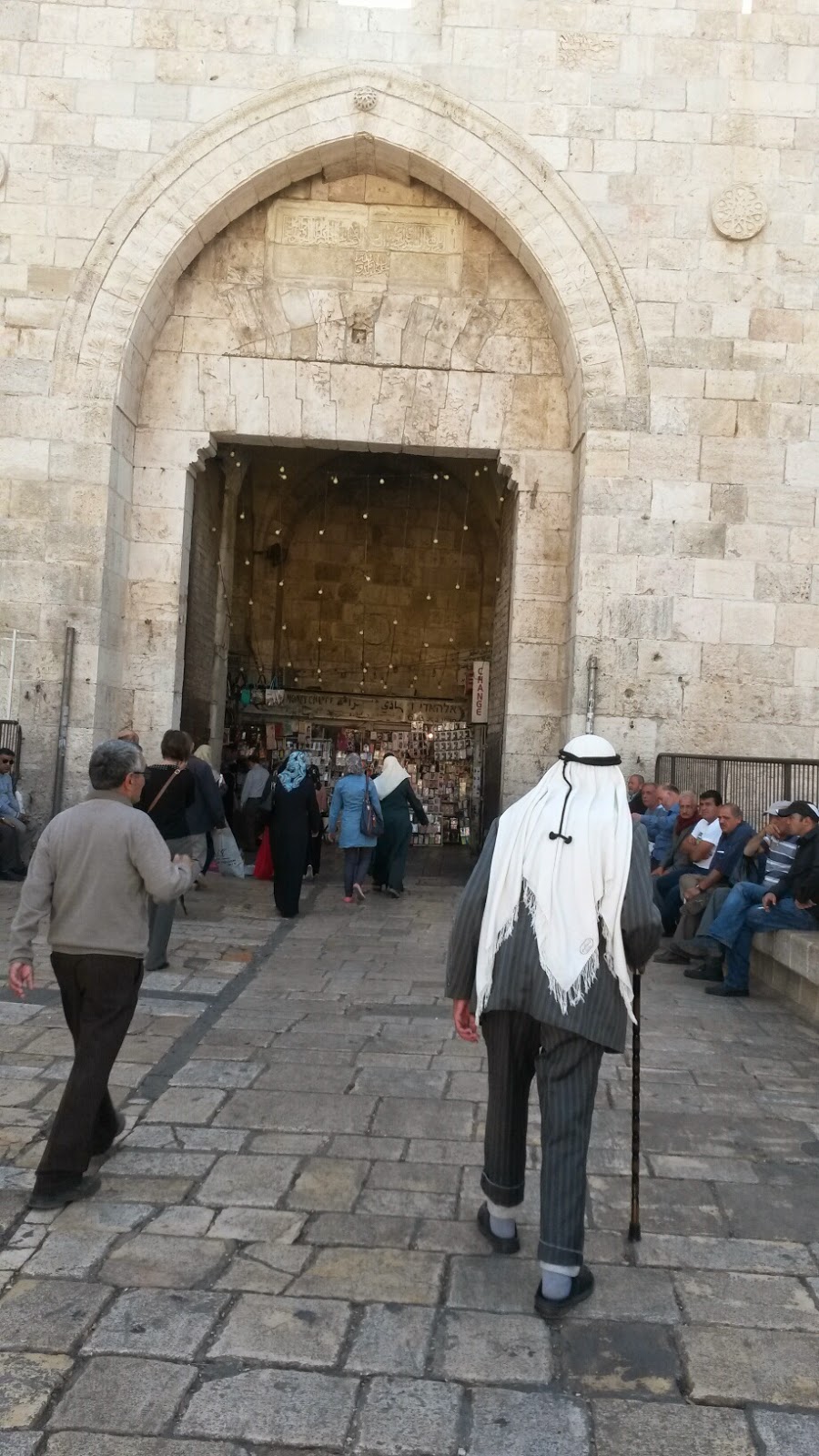Sunday morning: Love Among Equals
 |
| Damascus Gate, Jerusalem Photo by Carrie Smith |
Accompaniment is a lofty idea, but one which feels almost common
sense when you’re sitting in a room in Chicago with other brand-new
missionaries, eager to go out and “change the world” in the name of Jesus.
It’s quite another thing to experience it on the way to
church on a Sunday morning.
Yesterday, I set out for church at about 7:50 a.m., just in
time to hear the church bells at the Holy Sepulcher (Church of the
Resurrection) ringing at 8 a.m. as I walked into the Old City. After nearly 3
months of walking the same paths through various gates, I’m starting to know
some of the shopkeepers. I always get big smiles when I try out my fledgling
Arabic skills (“Sabah il khair! Good morning! Keef halek? How are you?”) Often these brief dialogues in
Arabic turn into 15 minutes detours as we speak in English about the occupation, the lack
of tourism traffic, where I’m from in the States, and where to buy the best
falafel.
On this Sunday, however, I was trying to avoid such a delay.
I had spent all of Saturday harvesting olives for the Lutheran World Federation
(harvesting olives on the Mt. of Olives! Seriously!) and my entire body was
telling me to go back to bed instead of church.
As luck would have it, one of the regulars on my route was
sitting outside his shop already. As I approached, he called out “Good morning!
I insist to give you a water. Please, go inside and open the fridge to get a
small water.”
Experience has taught me this is an offer one cannot
refuse. I thanked the shopkeeper and went inside to get the water. Of course,
this wasn’t the end of the conversation.
“Have you seen my painting? It is hand-done.” Soon, we are
looking at Victor’s hand-painted tiles, plates, and plaques. Most are so dusty
that the true colors are muted. Victor’s shop is tiny and easy to miss, and
Victor himself could easily be classified as elderly.
“This is for you. I want you to have it.”
Victor handed me a tile on which was printed (not
hand-painted), “Jerusalem.” I had actually owned one exactly like it, which shattered (ironically) on our move to Jerusalem.
“You don’t have to do this, Victor! Really!”
“What?” he said. “We are not friends?”
The tile went into my purse.
When I was finally able to continue on to church (15 minutes
later) I was thinking how I really needed to hurry now. I rounded the corner and
saw Abdullah, a homeless man who greets me with a smile and the same brief conversation in Arabic every day. (He’s actually the one
who has taught me my most useful Arabic phrases!)
As I walked toward him, I
thought to myself: “Aha! I’m going to give Abdullah this cold bottle of water.
I don’t need it, and I’ll be happy to give him something.”
Preparing for my big feel-good moment of the morning, I
crossed over to the side of the street where he was sitting and flashed a big
smile. “Sabah il khair, Abdullah!”
“Sabah il nur!” he replied. And then, just like that, he was
pressing a pack of peppermints into my hand.
“A gift for you, habibti,” he said.
Thunder completely stolen! My plan was ruined! I thanked him, but then stretched
out my hand with the cold bottle of water. “For you,” I said.
He looked up at me sadly, and in an instant I realized what
I had done. Just like that, his generous gift of love had become a transaction. He
gives me peppermints, I give him water. My discomfort with a homeless Muslim
offering me a gift on my way to church had caused me to attempt to even the
playing field.
Abdullah said, “No, I have water,” and gestured to an empty
bottle lying on the street next to him. “No, please, take it,” I insisted, two
more times. Then, per Arab culture, because I had offered three times, he was
obliged to receive the water.
I walked on to church, trying to feel good and generous, but with this dialogue weighing heavily upon me. When I reached the church, I saw
three older members of the Arabic-speaking congregation sitting outside the
doors of the main sanctuary. The time change had happened the night before in
Jerusalem (but 3 days before in the West Bank) and it was clear to me that
these folks had gotten confused about when worship was happening.
“Sabah il khair!” I said. Abu Emil replied “Sabah il nur!”
and then chattered on in Arabic for a few more minutes. He followed me down the
street and then hovered over me as I fumbled for my keys and opened the
door near my office. We both stepped inside.
“Shukran!” the old man said with a smile, and simultaneously pressed a
candy into my hand. It was 8:10 a.m., and I had so far received four gifts on
the way to Sunday worship.
What is accompaniment? What does it mean to let go of our
need to be the givers, and learn to be receivers? How can we honestly acknowledge
the privilege, education, and resources we bring with us to the mission field (wherever that may be) and at the same time respect and receive what our neighbors have to offer and to teach us?
“If there is no friendship with them [the poor] and no
sharing of the life of the poor, then there is no authentic commitment to
liberation, because love exists only among equals.”
― Gustavo Gutiérrez, "A Theology of Liberation"
 |
| Olive trees on the Lutheran World Federation Campus, Mt. of Olives Photo by Carrie Smith |


Comments
Post a Comment